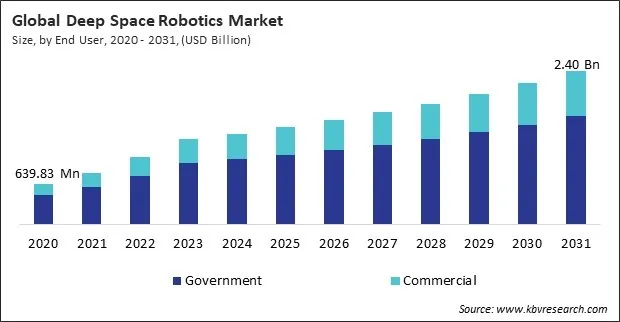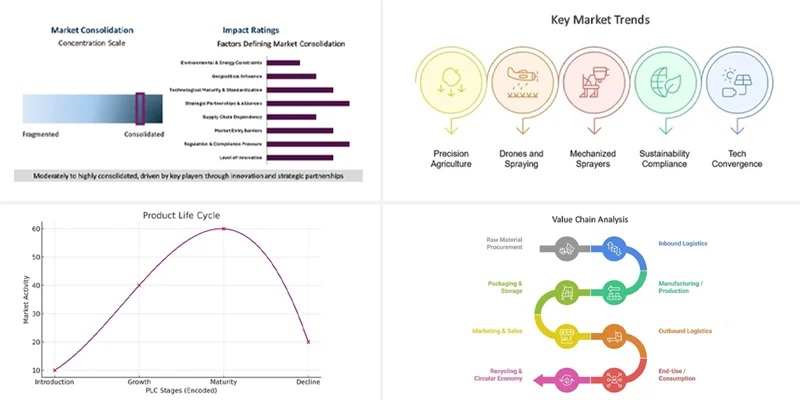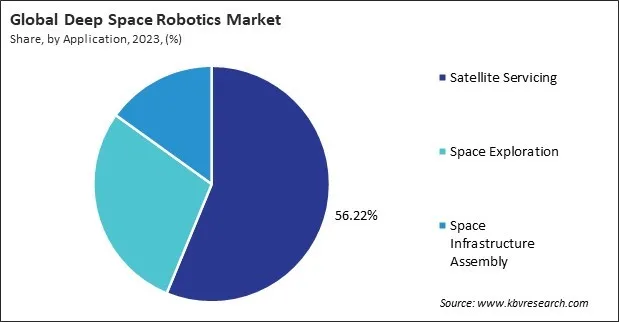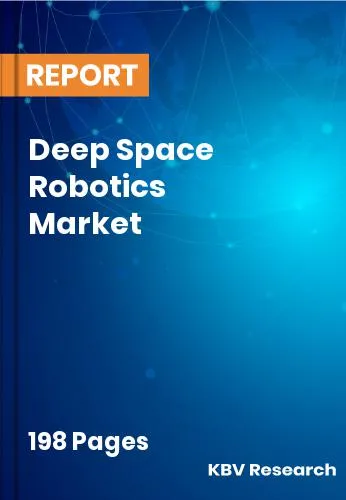“Global Deep Space Robotics Market to reach a market value of USD 2.40 Billion by 2031 growing at a CAGR of 7.8%”
The Global Deep Space Robotics Market size is expected to reach $2.40 billion by 2031, rising at a market growth of 7.8% CAGR during the forecast period.
The Artemis program and Mars missions further highlight the region’s dominance in robotic space technologies. With continued investment in AI-driven robotics and deep space automation, North America is expected to maintain its leadership in this market. Thus, the North America segment recorded 41% revenue share in the market in 2023. The region benefits from strong government support, with NASA leading numerous deep space exploration initiatives. Additionally, private companies such as SpaceX and Blue Origin are driving advancements in space robotics for satellite servicing, planetary exploration, and space infrastructure development.

The increasing interest in space tourism and commercial space exploration drives demand for deep space robotics. Private companies like SpaceX, Blue Origin, and Virgin Galactic are pioneering commercial spaceflight initiatives to make space travel accessible for civilians. With the commercialization of space tourism, robotic systems are essential to support spacecraft operations, automate routine maintenance, and assist in ensuring passenger safety. In conclusion, growing interest in space tourism and commercial space exploration drives the market's growth.
Additionally, robotic arms and manipulators are increasingly essential for spacecraft operations, particularly for performing intricate tasks such as satellite servicing, cargo handling, and scientific instrumentation deployment. These robotic systems improve mission efficiency by enabling remote-controlled and autonomous operations, reducing astronaut workload, and minimizing the risks associated with extravehicular activities. Therefore, the rising demand for robotic arms and manipulators for spacecraft operations drives the market's growth.
However, developing deep space robotics requires substantial financial investment due to the need for specialized components, extensive research, and rigorous testing. Unlike terrestrial robots, space-grade robotic systems must be engineered to withstand extreme radiation, microgravity, and vacuum conditions. This necessitates high-performance materials and advanced manufacturing techniques, significantly increasing production costs. In conclusion, the high costs associated with developing and deploying deep space robotics are impeding the market's growth.


Based on solution, the market is characterized into remotely operated vehicles, remote manipulator system, software, and services. The software segment garnered 47% revenue share in the market in 2023. The increasing reliance on advanced software solutions for autonomous navigation, data processing, and robotic control has been a key driver for this segment’s growth. Deep space exploration missions require sophisticated algorithms for machine learning, artificial intelligence, and real-time decision-making, enhancing the efficiency and precision of robotic systems.
By application, the market is divided into space exploration, satellite servicing, and space infrastructure assembly. The space exploration segment witnessed 29% revenue share in the market in 2023. The increasing number of interplanetary missions, lunar explorations, and Mars rovers has significantly contributed to the segment’s dominance. Space agencies and private companies heavily invest in robotic systems to conduct scientific research, terrain mapping, and resource identification in deep space environments.

Based on end user, the market is segmented into government and commercial. The government segment procured 72% revenue share in the market in 2023. National space agencies, including NASA, ESA, Roscosmos, CNSA, and ISRO, have been at the forefront of deep space exploration, investing heavily in robotic systems for planetary exploration, space research, and satellite deployment. Governments allocate substantial budgets to support long-term space missions, focusing on technological advancements in robotics, AI, and autonomous systems.
Free Valuable Insights: Global Deep Space Robotics Market size to reach USD 2.40 Billion by 2031
Region-wise, the market is analyzed across North America, Europe, Asia Pacific, and LAMEA. The Europe segment witnessed 28% revenue share in the market in 2023. The European Space Agency (ESA) and aerospace giants like Airbus and Thales Alenia Space have been actively involved in robotic space missions. Europe contributes to planetary exploration, satellite servicing, and space debris removal.
| Report Attribute | Details |
|---|---|
| Market size value in 2023 | USD 1.33 Billion |
| Market size forecast in 2031 | USD 2.40 Billion |
| Base Year | 2023 |
| Historical Period | 2020 to 2022 |
| Forecast Period | 2024 to 2031 |
| Revenue Growth Rate | CAGR of 7.8% from 2024 to 2031 |
| Number of Pages | 198 |
| Number of Tables | 350 |
| Report coverage | Market Trends, Revenue Estimation and Forecast, Segmentation Analysis, Regional and Country Breakdown, Porter’s 5 Forces Analysis, Company Profiling, Companies Strategic Developments, SWOT Analysis, Winning Imperatives |
| Segments covered | End User, Application, Solution, Region |
| Country scope |
|
| Companies Included | Space Applications Services NV/SA, Lunar Resources, Inc., Honeybee Robotics (Ensign-Bickford Industries, Inc.), Ceres Robotics Inc., Astrobotic Technology, Inc., Northrop Grumman Corporation, Redwire Corporation (Made In Space, Inc.), iRobot Corporation, Metecs, LLC and Motiv Space Systems Inc. |
By End User
By Application
By Solution
By Geography
This Market size is expected to reach $2.40 billion by 2031.
Growing Interest in Space Tourism and Commercial Space Exploration are driving the Market in coming years, however, High Costs Associated with the Development and Deployment of Deep Space Robotics restraints the growth of the Market.
Space Applications Services NV/SA, Lunar Resources, Inc., Honeybee Robotics (Ensign-Bickford Industries, Inc.), Ceres Robotics Inc., Astrobotic Technology, Inc., Northrop Grumman Corporation, Redwire Corporation (Made In Space, Inc.), iRobot Corporation, Metecs, LLC and Motiv Space Systems Inc.
The expected CAGR of this Market is 7.8% from 2023 to 2031.
The Satellite Servicing segment is leading the Market by Application in 2023; thereby, achieving a market value of $1.3 billion by 2031.
The North America region dominated the Market by Region in 2023, and would continue to be a dominant market till 2031; thereby, achieving a market value of $955.7 Million by 2031.
Our team of dedicated experts can provide you with attractive expansion opportunities for your business.

 Drivers
Drivers
 Restraints
Restraints
 Opportunities
Opportunities
 Challenges
Challenges
